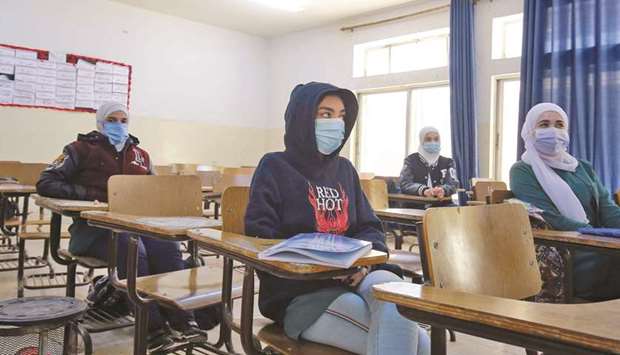Hundreds of thousands of students in Jordan went back to classrooms yesterday after almost a year of school closures due to the coronavirus pandemic.
“I am very happy to see my friends and teacher again,” said seven-year-old Makkah at a girls’ school in Jabal Amman, in the centre of the Jordanian capital.
“I was bored at home. Being at school is better,” the smiling girl said.
Schools and universities in the country have been shut since mid-March due to the pandemic.
Kindergarten and early elementary school levels, as well as students in their final year of high school, went back to classrooms yesterday, the first day of the school week in Jordan, while Christian schools will reopen for those students today. The UN agency for Palestinian refugees also reopened its schools yesterday for 28,000 students.
An education ministry spokesman said more than 773,000 students were going back to the classroom this week.
Fadi Ismail, a teacher at the Shukry Shaashaa school in Amman, was also keen to return.
“I am for in-person learning because in the classroom, I can see right away if a student is following,” he said.
“In class, there is a constant exchange...It’s very different from studying on the (online) platform.”
The government decided to reopen schools after a drop in the number of Covid-19 cases over the past four weeks.
Another 1.4mn students across the country will return gradually until March 7, according to the education and health ministries.
Bassam Hijjawi from the national epidemics committee said yesterday that the gradual return to schools would take place within “a strict health protocol”. He said all students were required to wear masks and observe physical distancing in the classroom, with two square metres provided for each desk.
The committee would evaluate the health impact of the return to classrooms over the next two weeks before confirming the return of other students, he said.
But some students said they preferred to keep learning at a distance.
“I’m afraid that by going to class, I’ll infect my parents with the virus,” said Khaled al-Kurdi, an 18-year-old in his final year of high school.
“And at distance, the courses are recorded so I can go over them until I have learnt the material,” he added.

Jordanian pupils wearing protective face masks attend class for the first time in nearly a year, in the capital Amman, yesterday.
